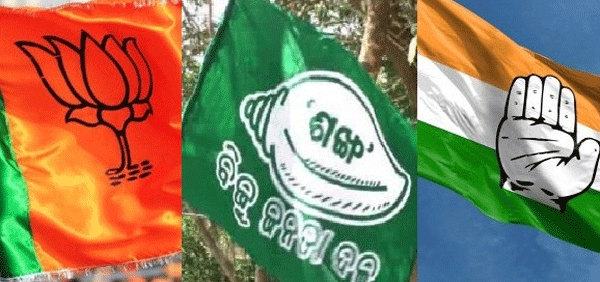As high-pitched campaigning for the by-elections in Odisha’s two assembly segments comes to an end, political parties have reasons to be worried over the possible outcomes. The parties pass through a long and anxious wait till counting of votes on 10 November since the voters of both the assembly segments, particularly in Balasore Sadar have reacted in a different manner.
Though the Balasore seat was held by the opposition BJP, the saffron party is not sure whether it could retain the seat. Similar is the fate of the ruling BJD which has put its entire efforts to win the polls, which they lost in 2019 general elections. All major parties — the ruling BJD, opposition Congress and BJP have fielded their candidates in Balasore and Tirtol assembly segments where by-elections are being held following deaths of two sitting MLAs, Madan Mohan Dutta and Bishnu Charan Das respectively.
The high voltage campaign in Balasore, one of the highest literate district headquarters in the state, has emitted a different signal this time. This is the place where the people had voted against BJD for which the Balasore assembly and Balasore Lok Sabha seats were won by the BJP.
Since, the saffron party captured Balasore Lok Sabha seat, Prime Minister Narendra Modi chose to take Pratap Sarangi in the council of ministers. Sarangi’s influence also helped the party to win two more assembly seats in Nilagiri and Balasore in 2019 general elections. As the BJP has a sizable support base in Balasore, the ruling BJD is doubtful that people will reject the saffron party completely.
Different trends were witnessed during campaigning in Balasore as common voters have accosted senior BJD leaders with difficult questions. Be it veteran Arun Dey or Pravat Biswal, many BJD leaders were forced to reply to the voters. When the women asked Arun Dey as to why the state’s BJD government does not prohibit liquor in Odisha, Pravat Biswal was questioned on the regional party’s inability to set up any industry in Balasore during its 20 years at the helm. Both the leaders had a tough time to face the volley of questions, the answers of which they certainly did not have. How can Arun Dey reply on the state government’s excise policy? Poor man, owing to his vast experience in politics, somehow managed the show. But, a youth put Pravat Biswal in a fix and the former MLA was at his wit’s end.The common voters have all rights to raise questions to the persons in power. It is also the responsibility of the ruling party to meet the queries of people instead of branding them as just opposition agents. It is certainly a good indication for the strengthening of democracy if the interlocutor is not planted by opposition to raise voice against the administration.
In case of Arun Dey, the accusation of such a planting does not hold water. The group of women that has been demanding complete prohibition in the state expressed their deep-seated displeasure during elections. The government should welcome such feedback from the people, particularly from women, on its excise policy. Liquor destroys families and Balasore women have dared to put the question to the ruling party. It is up to the ruling party to ignore the questions of the women, but the fact remains that most of the people do not appreciate circulation of liquor across the state in a big way.
Another negative signal was also received from Tirtol assembly segment which is also going to by-polls along with Balasore on 3 November. An assessment done by a neutral body said that the population of villages in Jagatsinghpur district has been identified with BJD, Congress or BJP. The people in a particular village are divided on the party lines. The elections will be over and the leaders will return to the state capital. But the people who are divided on party lines will stay in their places. Therefore, supporters of both the ruling and opposition parties will live in one village, but with different identities. People will be identified as BJD family, BJP supporters and Congress loyalists. This is not at all acceptable for a cordial atmosphere in villages.
Political parties should ensure that the village unity should not be vitiated and the people should not be divided on party lines. This trend might create new problems and the real charm of villages will be lost once the people are divided on political lines. In a village, all the families are linked to another in some way or rather. Even though they belong to different families, caste and creed, they share a common identity as the residents of certain villages. This should be allowed to remain intact for the better and healthy rural life in Odisha.
People should also realize that they are being used by political parties for their interest and not for the development of the villages. People at large should remain as public and not affiliated to any political party. They should be neutral and hold the string to pull down the party which does not work for the development of their areas. If they operate on party lines, the politicians will exploit their sentiments and ignore interests of villages. This is because, the parties take it for granted that such villages are their supporters. Therefore, they never bother to give importance to the particular area.
This time, the people of Balasore have shown the way and they should retain the right to raise questions to the government or the ruling party. It was clear that common people are on questioning mode. There should be no doubt that only one candidate belonging to one party will win. People should use their minds and think of long term development instead of receiving a gift or two before elections to cast their votes in favour of any party. The people should also judge the ability of the candidate they will vote for instead of their party affiliation, feel political analysts.


